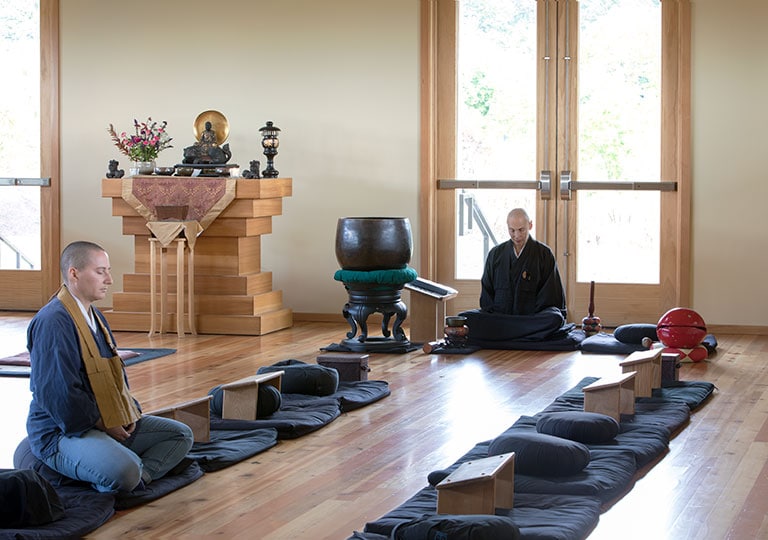Exploring Zen Meditation Techniques: A Comprehensive Guide

Are you curious about Zen meditation techniques? Look no further!
In this comprehensive guide, we will take you on a journey of self-discovery and tranquility. You will explore the origins and core principles of Zen meditation, learn essential postures and breathing techniques, and discover how to cultivate mindfulness and focus.
We will also delve into different forms of Zen meditation and provide tips for overcoming challenges.
Get ready to deepen your practice and find inner peace.
Key Takeaways
- Zen meditation originated in China and was later introduced to Japan, with its origins dating back to the teachings of the Buddha himself.
- Mindfulness and focusing on breath are core principles of Zen meditation, helping practitioners be present in the moment and cultivate inner calm.
- Letting go of attachment and desire is another important principle in Zen meditation, promoting self-reflection and improved self-awareness.
- Exploring different styles and techniques of Zen meditation, such as Koan meditation and walking meditation, can enhance the benefits and help find the practice that resonates the most.
The Origins of Zen Meditation
Zen meditation, also known as zazen, originated in China and was later introduced to Japan. The origins of Zen meditation can be traced back to the teachings of the Buddha himself, who emphasized the importance of mindfulness and awareness in attaining enlightenment.
However, it was during the Tang Dynasty in China that Zen Buddhism flourished and the practice of meditation became central to its teachings. The history of Zen meditation is closely intertwined with the lineage of Zen masters, who passed down their teachings through generations, emphasizing direct experience and the importance of sitting meditation.
It was in Japan, during the Kamakura period, that Zen meditation gained popularity and became a distinct school of Buddhism. Today, Zen meditation is practiced worldwide and continues to be a powerful tool for cultivating inner peace and self-realization.
Understanding the Core Principles of Zen Meditation
Understanding the core principles of zen meditation can help you deepen your practice and achieve a state of heightened awareness. By exploring different techniques, you can gain a deeper understanding of the benefits that zen meditation can bring to your life.
One of the core principles of zen meditation is the practice of mindfulness. This involves being fully present in the moment and observing your thoughts and emotions without judgment. By cultivating this quality of awareness, you can develop a greater sense of clarity and inner peace.
Another principle is the focus on breath. Paying attention to your breath can help anchor you in the present moment and calm your mind. It serves as a point of focus for your meditation practice.
Additionally, zen meditation emphasizes the importance of letting go of attachment and desire. This includes letting go of expectations, judgments, and the need for control. By releasing these attachments, you can experience a sense of liberation and acceptance.
Understanding these core principles and exploring different techniques can help you deepen your zen meditation practice, leading to a greater sense of peace, clarity, and overall well-being.
Essential Postures and Breathing Techniques in Zen Meditation
To fully immerse yourself in the practice of zen meditation, try incorporating essential postures and breathing techniques that can enhance your experience.
One essential posture is the cross-legged sitting position, commonly known as the lotus pose. This posture helps to align your body and promote stability during meditation.
Another important posture is the kneeling position, which provides a sense of grounding and allows for a straight spine.
Additionally, focusing on your breath is crucial in zen meditation. Utilize deep belly breathing, inhaling and exhaling slowly and consciously. By concentrating on your breath, you can calm your mind and bring yourself into the present moment.
These essential postures and breathing techniques can help create a conducive environment for your zen meditation practice.
Cultivating Mindfulness and Focus Through Zen Meditation
If you want to enhance your mindfulness and focus, exploring the benefits of mindfulness, techniques for focus, and Zen meditation practices can be incredibly helpful.
By practicing mindfulness, you can experience reduced stress levels, improved emotional well-being, and increased self-awareness.
Techniques such as deep breathing, body scanning, and guided imagery can help you cultivate focus and presence in the present moment.
Additionally, incorporating Zen meditation practices into your routine, such as sitting or walking meditation, can further deepen your mindfulness and focus abilities.
Benefits of Mindfulness
Focus on the present moment and notice how mindfulness can enhance your overall well-being. By practicing mindfulness, you can experience a range of benefits that contribute to a healthier and more fulfilling life. Here are three ways mindfulness can positively impact you:
- Stress Reduction: Mindfulness helps you become more aware of your thoughts and emotions, allowing you to respond to stress in a calm and balanced manner. It teaches you to observe stressful situations without judgment, reducing the negative impact they have on your well-being.
- Improved Emotional Wellbeing: Mindfulness cultivates a greater sense of self-compassion and acceptance. It helps you connect with your emotions and navigate them with kindness and understanding. This leads to improved emotional regulation and a greater sense of overall happiness.
- Enhanced Focus and Clarity: With regular mindfulness practice, you can train your mind to stay focused on the present moment, increasing your ability to concentrate and make clear decisions. This heightened focus also allows you to fully engage in activities, leading to a greater sense of fulfillment.
Incorporating mindfulness into your daily routine can significantly improve your quality of life, reducing stress and fostering emotional well-being.
Techniques for Focus
Practicing mindfulness can help you improve your focus and clarity. When it comes to improving concentration and enhancing mental clarity, there are a few techniques you can try.
One technique is focused breathing. Find a quiet space, sit in a comfortable position, and simply focus on your breath. As thoughts enter your mind, acknowledge them and gently bring your attention back to your breath.
Another technique is body scan meditation. Lie down and bring your awareness to each part of your body, starting from your toes and moving up to your head. Notice any sensations or tension and allow them to release.
Lastly, try using a visual anchor. Choose an object or image that brings you a sense of calm and focus your attention on it.
These techniques can help you train your mind to stay present and improve your ability to concentrate.
Zen Meditation Practices
Using a combination of focused breathing, body scan meditation, and visual anchors, you can train your mind to stay present and improve your ability to concentrate during Zen meditation practices.
Here are three powerful benefits of incorporating Zen meditation into your daily life:
- Reduced stress: By practicing Zen meditation regularly, you can cultivate a sense of inner peace and calm. This can help you manage stress more effectively and maintain a balanced state of mind, even in challenging situations.
- Enhanced self-awareness: Zen meditation encourages self-reflection and introspection. It allows you to observe your thoughts and emotions without judgment, leading to a deeper understanding of yourself and your patterns of thinking.
- Improved focus and concentration: Through the practice of Zen meditation, you can develop a greater capacity to concentrate and stay present. This heightened focus can benefit various aspects of your life, such as work, relationships, and daily tasks.
Exploring Different Forms of Zen Meditation
There’s a wide variety of Zen meditation forms to explore and try out. When it comes to different styles of Zen meditation, you have plenty of options.
One popular form is Zazen, which involves sitting in a crossed-legged position with your eyes slightly open, focusing on your breath. Zazen helps cultivate mindfulness and inner peace.
Another style is Koan meditation, where you contemplate a paradoxical question to reach a state of enlightenment. Koan meditation challenges the mind and can lead to deep insights.
Walking meditation, known as Kinhin, involves mindful walking in a slow and deliberate manner. It can help bring a sense of calm to your body and mind.
Each style has its benefits and drawbacks, so it’s worth exploring different forms to find the one that resonates with you the most.
Overcoming Challenges and Obstacles in Zen Meditation
When it comes to your meditation practice, there are a few challenges and obstacles that you may encounter. One common challenge is dealing with mental distractions, like racing thoughts or worries that pop up during your session.
Additionally, physical discomfort and pain can make it difficult to stay focused and present.
Lastly, learning how to deal with wandering thoughts can be a struggle, as the mind naturally tends to wander.
However, by acknowledging these challenges and adopting strategies to overcome them, you can enhance your meditation practice and deepen your mindfulness.
Mental Distractions During Meditation
Mental distractions can hinder the effectiveness of your meditation practice. As you strive to find inner peace and clarity, it’s crucial to overcome these obstacles and improve your concentration.
Here are three strategies that can help you overcome mental distractions during meditation:
- Acknowledge and let go: When distracting thoughts arise, acknowledge them without judgment and gently let them go. Allow yourself to return to the present moment and focus on your breath or chosen focal point.
- Use a mantra: Repeat a simple word or phrase silently in your mind to divert your attention from distracting thoughts. This can help anchor your focus and bring you back to the present moment.
- Practice mindfulness: Cultivate a non-judgmental awareness of your thoughts and emotions as they arise during meditation. By observing them without getting caught up in them, you can develop a greater sense of mental clarity and improve your ability to concentrate.
Physical Discomfort and Pain
Now that you’ve learned how to handle mental distractions during meditation, let’s tackle a new challenge: physical discomfort and pain. It’s natural to experience some discomfort when you sit for long periods of time, but don’t let it discourage you. Managing discomfort is an important part of finding inner peace. Remember, your body and mind are interconnected, and by cultivating a calm and focused state of mind, you can alleviate physical discomfort. Use the power of your breath to anchor yourself during moments of discomfort. Embrace the sensations, but don’t let them consume you. To help you navigate this aspect of meditation, here’s a table that highlights some common physical discomforts and suggestions for managing them:
| Physical Discomfort | Suggestions for Managing |
|---|---|
| Back pain | Use a cushion or support |
| Leg numbness | Adjust your posture |
| Neck stiffness | Gently stretch |
| Restlessness | Focus on your breath |
Dealing With Wandering Thoughts
To overcome wandering thoughts, you need to gently redirect your focus back to your breath and let go of any judgments or frustrations that arise. It’s natural for your mind to wander during meditation, but the key is to bring yourself back to the present moment without getting caught up in the thoughts.
Here are three techniques to help you deal with wandering thoughts:
- Mindful Eating: Instead of rushing through your meals, try to eat mindfully. Pay attention to the flavors, textures, and smells of your food. This practice can help you cultivate awareness and focus, which can be carried over to your meditation practice.
- Mantra Repetition: Choose a word or phrase that resonates with you and repeat it silently or aloud during your meditation. The repetition of the mantra can help anchor your attention and prevent your mind from wandering.
- Acceptance and Non-judgment: When thoughts arise, instead of resisting or judging them, simply observe them without attachment. Acknowledge their presence and gently bring your attention back to your breath. Remember, meditation is a practice of acceptance and non-judgment.
Deepening Your Zen Meditation Practice: Tips and Advice
Take a moment to reflect on your zen meditation practice, and consider how you can deepen it with these helpful tips and advice. Deepening your concentration and finding inner peace are essential aspects of a fulfilling meditation practice. To enhance your experience, try incorporating the following techniques:
| Technique | Benefits | Tips and Advice |
|---|---|---|
| Breath Awareness | Increases focus and relaxation | Focus on your breath and observe it without judgment |
| Body Scan | Helps release tension and promotes body-mind connection | Start from your head and slowly move down to your toes, noticing any sensations |
| Mantra Meditation | Calms the mind and cultivates inner stillness | Choose a word or phrase that resonates with you and repeat it silently |
Frequently Asked Questions
How Long Does It Take to See the Benefits of Zen Meditation?
You’ll start seeing the benefits of zen meditation in just a few weeks. The duration varies, but with consistent practice, you’ll experience increased mindfulness and its positive effects on your overall well-being.
Can Anyone Practice Zen Meditation, Regardless of Their Religious or Spiritual Beliefs?
Yes, anyone can practice zen meditation, no matter their religious or spiritual beliefs. Even atheists or agnostics can benefit from the calming and introspective nature of zen meditation. Give it a try!
Are There Any Specific Dietary or Lifestyle Recommendations to Enhance the Practice of Zen Meditation?
To enhance your practice of Zen meditation, there may be specific dietary recommendations and lifestyle suggestions. These can play a role in creating a conducive environment for deepening your meditation practice and cultivating mindfulness.
What Is the Role of a Zen Meditation Teacher or Guide, and How Can One Find a Qualified Teacher?
A Zen meditation teacher or guide plays a crucial role in your practice. They provide guidance, support, and help you deepen your understanding. To find a qualified teacher, seek recommendations from trusted sources or visit local meditation centers.
Are There Any Specific Rituals or Ceremonies Associated With Zen Meditation That Practitioners Should Be Aware Of?
There are specific rituals and ceremonies associated with Zen meditation. It’s important to be aware of them as a practitioner. They play a significant role in cultivating mindfulness and bringing a sense of reverence to the practice.









